


|
Commenced:
|
01/08/2012 |
|---|---|
|
Submitted:
|
18/12/2012 |
|
Last updated:
|
02/01/2019 |
|
Location:
|
2912 6th St, Boulder, Colorado, US |
|
Phone:
|
303-449-7219 |
|
Website:
|
http://cantelow.com |
|
Climate zone:
|
Cold Temperate |
(projects i'm involved in)
Back to Ann Cantelow's Home
Project: Ann Cantelow's Home
Posted by Ann Cantelow over 11 years ago
In my day job, I'm a computer programmer, and have written several full systems in my career life. My garden has similarities to a software project.
In my experience with software projects, there is a period of full chaos before it all comes together into a beautiful ordered whole. The chaos is from ideas and inputs, considerations of all things related, trials of different approaches. There's a time when everything swirls around- then it coalesces, starts to hang together here and there, and proceeds on to dovetail together til everything fits and mutual support is found.
The garden is pretty much all mess and chaos now. Let's hope the order comes along with time!
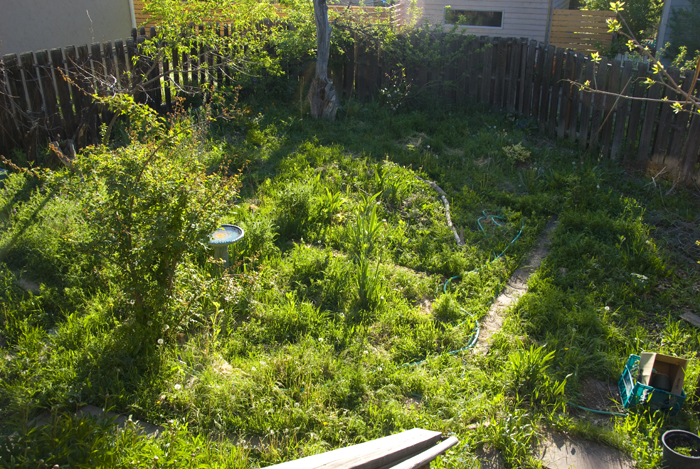
I've put the most effort into tackling the largest back area, which is gently downslope from the house on the east side, but my activity has spilled out into all the garden areas. There are lots of various types of legumes planted everywhere. There's hairy vetch, several types of clover, quite a lot of fava bean plants, various other types of beans that I've forgotten what they are. There's a "globe pea shrub" that I bought from a nursery, and I've started some tiny seedlings for mimosa trees and Siberian pea shrub, also thinleaf alder, which is also nitrogen-fixing.
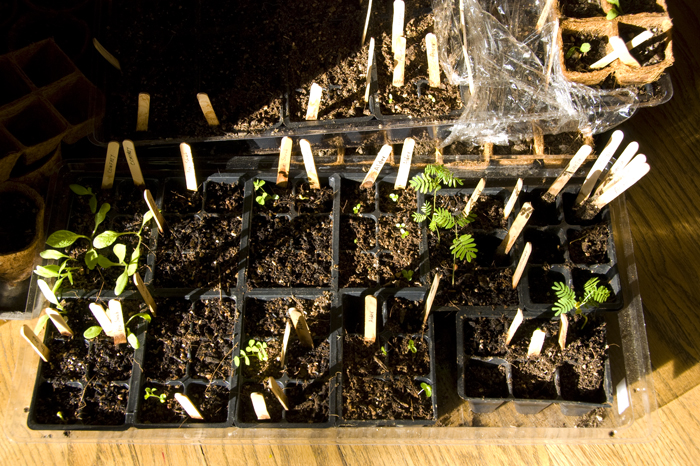
The seedling adventures have been rather confusing, as I have no experience doing this sort of thing. I've learned that it's important with my awkwardness to get especially good potting soil for seedlings, and to follow instructions for stratifying and scarifying, which are new concepts to me and interesting. I've had some success starting seeds in damp paper towels, though some things get started but don't always make it through transplanting into soil. I'm still learning not to over- or under- water them. And I planted some out too soon and they didn't make it. It's heartbreaking when the little tiny guys die. I've also tried comfrey and blueberries from seed. The blueberries probably won't make it, but it's possibly a too dry climate for them here anyway.
I've had a great time learning about hot composting. My first ever pile was built of straw, some newspaper and a stinky bin full of a winter's worth of kitchen scraps. I found this site very helpful -- Deep Green Permaculture compost page -- http://deepgreenpermaculture.com/diy-instructions/hot-compost-composting-in-18-days/, and the long list of comments there are also invaluable. My pile got a little too hot, up to 70 degrees Celsius, and for a few days I turned it every day to try to keep it from going higher. It has cooled down now to 37 degrees or so but still isn't complete, after about a month. It's taking me a bit longer than the promised 18 days, but I think it will get there, starting to get close. Currently, the pile has quite a lot of plump white myceliums growing in it. Some mushrooms have formed inside it, and are cutely poking out the sides in-between turnings. I look forward to trying this again, it's fun! A thing I've learned- torn newspaper tends to stick together when wet. There is a suggestion in the reference above to crumple sheets into a ball instead; this would work much better I believe.
It looks like I will not be using our power mower this year, for the first time ever. There are too many other plants now in amongst the grass, also twigs and small logs, which I am laying out here and there on contour. I'm finding it quite workable to use a small Japanese hand sickle instead of the mower. I hope to replace all grass in all but a circular meadow-like area in the front section. The grass replacing is coming along- the hairy vetch and other plants have started taking over. I've learned to sharpen and clean my sickle, thanks to many youtube videos available that explain such things.
I decided one mini-swale I had dug was too wide and in the wrong place. I filled it in with branches and put some dirt over that. It's now a rather nice shallow bowl-like flat area. I dug a narrower, ditch-like short swale a little higher up; I think that's better. A small place like this, you can change your mind about where things go! I'm planning a frog pond in my south side area.
I've put boards out in places to walk on for now, to try not to compact the soil too much. I haven't decided where walkways might go yet, and also I want fungi under the ground to be free to communicate with each other. I'm considering stepping stones and boards rather than solid walkways.
Here are some more photos to close. These photos are just a couple of weeks old, and the place has grown up quite a bit already in the time since then, all of a sudden. The vetches are blooming and more and more bees are visiting them.
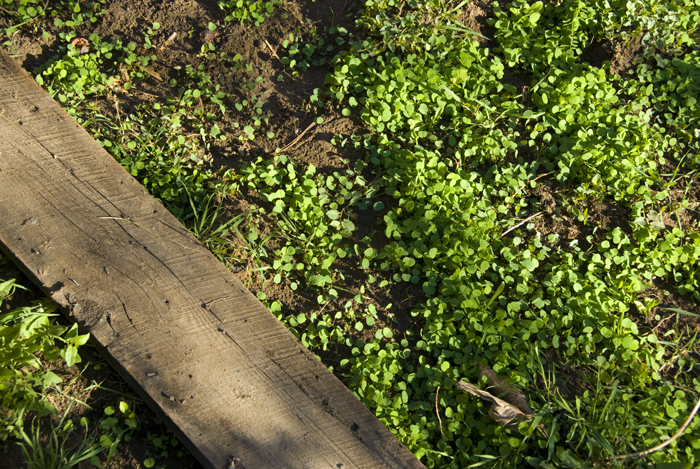
Board and clover
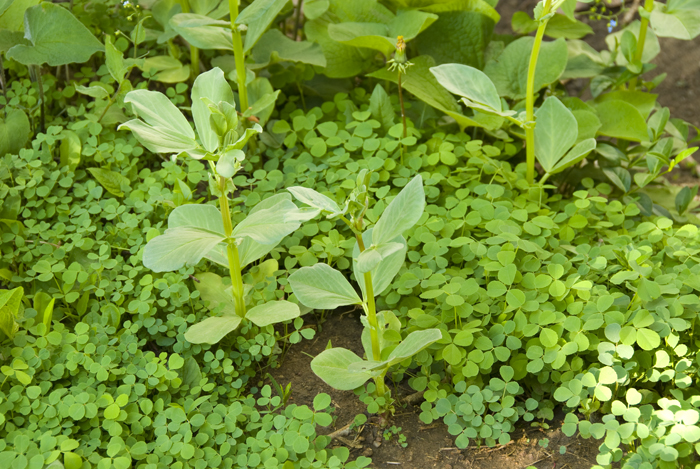
Fava beans and clover
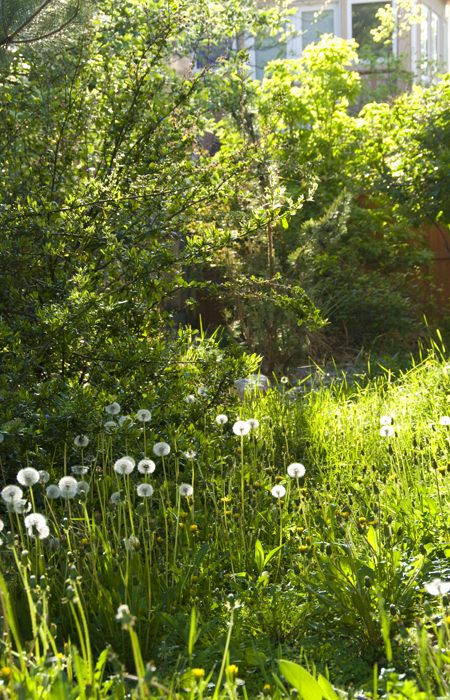
Dandelions now allowed!
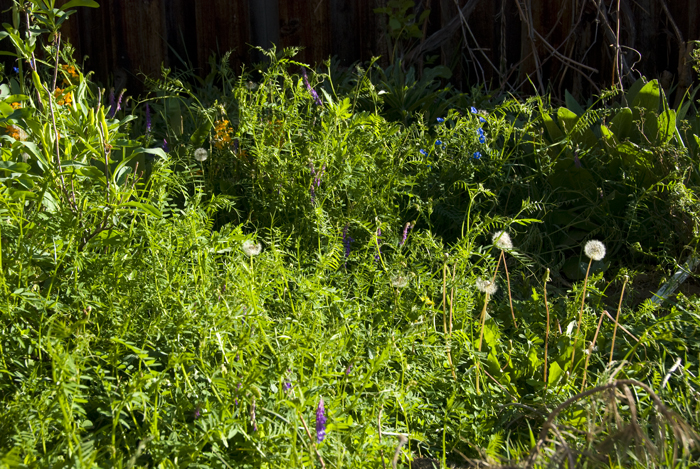
Vetch, dandelion, wallflowers, forget-me-nots
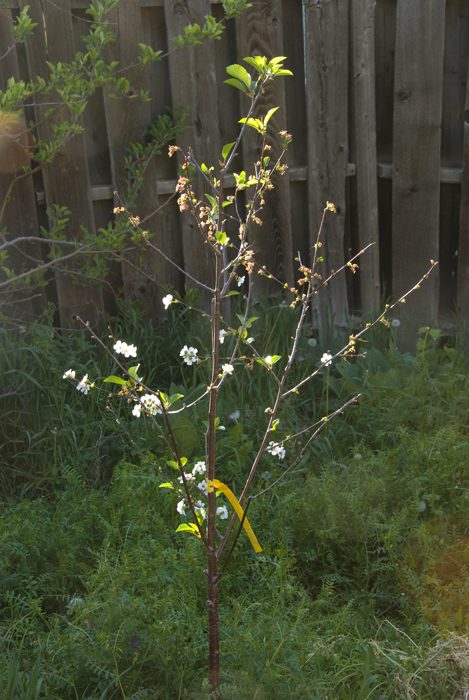
Little sour cherry tree

Clover and stepping stone
You must be logged in to comment.


Note: The various badges displayed in people profiles are largely honesty-based self-proclamations by the individuals themselves. There are reporting functions users can use if they know of blatant misrepresentation (for both people and projects). Legitimacy, competency and reputation for all people and projects can be evidenced and/or developed through their providing regular updates on permaculture work they’re involved in, before/after photographs, etc. A spirit of objective nurturing of both people and projects through knowledge/encouragement/inspiration/resource sharing is the aim of the Worldwide Permaculture Network.
 |
MemberA member is a permaculturist who has never taken a PDC course. These cannot become PDC teachers. Members may be novice or highly experienced permaculturists or anywhere in between. Watch their updates for evaluation. |
|---|---|
  |
Permaculture MatchmakerOne of these badges will show if you select your gender and the "I'm single, looking for a permaculture partner" option in your profile. |
 |
PDCPeople who claim to have taken a Permaculture Design Certificate (PDC) course somewhere in the world. |
 |
PDC VerifiedPeople who have entered an email address for the teacher of their PDC course, and have had their PDC status verified by that teacher. Watch their updates for evaluation. |
 |
PRI PDCPeople who’ve taken a Permaculture Research Institute PDC somewhere in the world. |
 |
PDC TeacherPeople who claim to teach some version of PDC somewhere in the world. |
 |
PRI TeacherWith the exception of the ‘Member’ who has never taken a PDC, all of the above can apply to become a PRI PDC Teacher. PRI PDC Teachers are those who the PRI recognise, through a vetting board, as determined and competent to teach the full 72-hour course as developed by Permaculture founder Bill Mollison – covering all the topics of The Designers’ Manual as well as possible (i.e. not cherry picking only aspects the teacher feels most interested or competent in). Such teachers also commit to focussing on the design science, and not including subjective spiritual/metaphysical elements. The reason these items are not included in the PDC curriculum is because they are “belief” based. Permaculture Design education concerns itself with teaching good design based on strategies and techniques which are scientifically provable. PRI PDC Teachers may be given teaching and/or consultancy offerings as they become available as the network grows. |
 |
Aid WorkerThe individual with this badge is indicating they are, have, or would like to be involved in permaculture aid work. As such, the individual may or may not have permaculture aid worker experience. Watch their updates for evaluation. |
 |
ConsultantThe individual with this badge is indicating they are, have, or would like to do paid permaculture design consultancy work. As such, the individual may or may not have permaculture consultancy experience. Watch their updates for evaluation. |
 |
Community ProjectCommunity projects are projects that help develop sustainable community interaction and increase localised resiliency. |